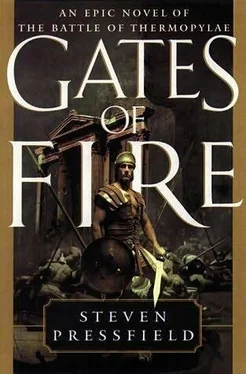Steven Pressfield - Gates of Fire - An Epic Novel of the Battle of Thermopylae
Здесь есть возможность читать онлайн «Steven Pressfield - Gates of Fire - An Epic Novel of the Battle of Thermopylae» весь текст электронной книги совершенно бесплатно (целиком полную версию без сокращений). В некоторых случаях можно слушать аудио, скачать через торрент в формате fb2 и присутствует краткое содержание. Жанр: Историческая проза, на английском языке. Описание произведения, (предисловие) а так же отзывы посетителей доступны на портале библиотеки ЛибКат.
- Название:Gates of Fire: An Epic Novel of the Battle of Thermopylae
- Автор:
- Жанр:
- Год:неизвестен
- ISBN:нет данных
- Рейтинг книги:3 / 5. Голосов: 1
-
Избранное:Добавить в избранное
- Отзывы:
-
Ваша оценка:
- 60
- 1
- 2
- 3
- 4
- 5
Gates of Fire: An Epic Novel of the Battle of Thermopylae: краткое содержание, описание и аннотация
Предлагаем к чтению аннотацию, описание, краткое содержание или предисловие (зависит от того, что написал сам автор книги «Gates of Fire: An Epic Novel of the Battle of Thermopylae»). Если вы не нашли необходимую информацию о книге — напишите в комментариях, мы постараемся отыскать её.
Gates of Fire: An Epic Novel of the Battle of Thermopylae — читать онлайн бесплатно полную книгу (весь текст) целиком
Ниже представлен текст книги, разбитый по страницам. Система сохранения места последней прочитанной страницы, позволяет с удобством читать онлайн бесплатно книгу «Gates of Fire: An Epic Novel of the Battle of Thermopylae», без необходимости каждый раз заново искать на чём Вы остановились. Поставьте закладку, и сможете в любой момент перейти на страницу, на которой закончили чтение.
Интервал:
Закладка:
The marine next began teasing the Spartans about their notoriously short xiphos swords. He refused to believe that these were the actual weapons the Lakedaemonians carried into battle.
They must be toys. How could such diminutive apple-corers possibly work harm to an enemy?
The trick is-Dienekes demonstrated, pressing himself chest-to-chest to the Egyptian Tommie -to get nice and cozy.
When they parted, the Spartans presented the marines with two skins of Phalerian wine, the finest they had, a gift intended for the Rhodian consulate. The marines gave each Spartan a gold daric (a month's pay for a Greek oarsman) and a sack apiece of fresh Nile pomegranates.
The mission returned to Sparta unsuccessful. The Rhodi-ans, as His Majesty knows, are Dorian Hellenes; they speak a dialect similar to the Lakedaemonians and call their gods by the same Doric -derived names. But their island had been since before the first Persian War a protectorate of the Empire. What option other than submission did the Rhodians possess, their nation lying as it does within the very shadow of the masts of the imperial fleet? The Spartan embassy had sought, against all expectation, to detach through ancient bonds of kinship some portion of the Rhodian navy from service to His Majesty. It found no takers. Nor had there been, our embassy learned upon its return to the mainland, from simultaneous missions dispatched to Crete, Cos, Chios, Lesbos, Samos, Naxos, Imbros, Samo-thrace, Thasos, Skyros, Mykonos, Faros, Tenos and Lemnos. Even Delos, birthplace of Apollo himself, had offered tokens of submission to the Persian.
Phobos.
This terror could be inhaled in the air of Andros, where we touched upon the voyage home. One felt it like a sweat on the skin at Keos and Hermione, where no harbor inn or beaching ground lacked for ship's masters and oarsmen with terror- inspiring tales of the scale of mobilization in the East and eyewitness reports of the uncountable myriads of the enemy.
Phobos.
This stranger accompanied the embassy as it landed at Thyrea and began the dusty, two-day hump across Parnon to Lakedaemon. Trekking up the eastern massif, the envoys could see landsmen and city folk evacuating their possessions to the mountains. Boys drove asses laden with sacks of corn and barley, protected by the men of the family under arms. Soon the old ones and the children would follow. In the high country, clan groups were burying jars of wine and oil, building sheepfolds and carving crude shelters out of the cliffsides.
Phobos.
At the frontier fort of Karyai, our party fell in with an embassy from the Greek city of Plataea, a dozen men including a mounted escort, headed for Sparta. Their ambassador was the hero Arimnestos of Marathon. It was said that this gentleman, though well past fifty, had in that famous victory ten years past waded in full armor into the surf, slashing with his sword at the oars of the Persian triremes as they backed water, fleeing for their lives. The Spartans loved this sort of thing. They insisted on Arimnestos' party joining ours for supper and accompanying us on the remaining march to the city itself.
The Plataean shared his intelligence of the enemy. The Persian army, he reported, comprised of two million men drawn from every nation of the Empire, had assembled at the Great King's capital, Susa, in the previous summer. The force had advanced to Sardis and wintered there.
From this site, as the greenest lieutenant could not fail to project, the myriads would proceed north along the coast highways of Asia Minor, through Aeolis and the Troad, crossing the Hellespont by either bridge of boats or massive ferrying operation, then proceed west, traversing Thrace and the Chersonese, southwest across Macedonia and then south into Thessaly.
Greece proper.
The Spartans recounted what they had learned at Rhodes; that the Persian army was already on the march from Sardis; the main body stood even now at Abydos, readying to cross the Hellespont.
They would be in Europe within a month.
At Selassia a messenger from the ephors in Sparta awaited my master with an ambassadorial pouch. Dienekes was to detach himself from the party and proceed at once to Olympia. He took his leave at the Pellana road and, accompanied by myself alone, set out at a fast march, intending to cover the fifty miles in two days.
It is not uncommon upon these treks to have fall in with one as he tramps various high-spirited hounds and even half-wild urchins of the vicinity. Sometimes these carefree comrades remain on the troop all day, trotting in merry converse at the trekker's heels. Dienekes loved these ranging strays and never failed to welcome them and take cheer in their serendipitous companionship.
This day, however, he sternly dismissed all we encountered, canine as well as human, striding resolutely onward, glancing neither left nor right.
I had never seen him so troubled or so grave.
An incident had occurred at Rhodes which I felt certain lay at the source of my master's disquiet.
This event transpired at the harbor, immediately after the Spartans and Egyptian marines had completed their exchange of gifts and were making ready to take leave of one another. There arose then that interval when strangers often discard that formality of intercourse with which they have heretofore conversed and speak instead man-to-man, from the heart. The captain Ptammitechus had clearly taken to my master and the poiemarch Olympieus, Alexandras' father.
He summoned these now aside, declaring that he had something be wished to show them. He led them into the naval commander's campaign tent, erected there upon the strand, and with this officer's permission produced a marvel the like of which the Spartans, and of course I myself, had never beheld. This was a map.
A geographer's representation not merely of Hellas and the islands of the Aegean but of the entire world.
The chart spread in breadth nearly two meters, of consummate detail and craftsmanship and inscribed upon Nile papyrus, a medium so extraordinary that though held to the light one could see straight through it, yet even the strongest man's hands could not rend it, save by first opening a tear with the edge of a blade.
The marine rolled the map out upon the squadron commander's table. He showed the Spartans their own homeland, in the heart of the Peloponnese, with Athens 140 miles to the north and east, Thebes and Thessaly due north of there, and Mounts Ossa and Olympus at the northernmost extremity of Greece. West of this the mapmaker's stylus had depicted Sikelia, Italia and all the leagues of sea and land clear to the Pillars of Herakles. Yet the bulk of the chart had barely begun to be unfurled.
I wish only to impress upon you, for your own preserva-tion, gentlemen, Ptammitechus addressed the Spartans through his interpreter, the scale of His Majesty's Empire and the resources he commands to bring against you, that you may make your decision to resist or not, based upon fact and not fancy.
He unrolled the papyrus eastward. Beneath the lamplight arose the islands of the Aegean, Macedonia, Illyria, Thrace and Scythia, the Hellespont, Lydia, Karia, Cilicia, Phoenicia and the Ionic cities of Asia Minor. All these nations the Great King controls. AH these he has compelled into his service. All these are coming against you. But is this Persia? Have we reached yet the seat of Empire…
Out rolled more leagues of landmass. The Egyptian's hand swept over the outlines of Ethiopia, Libya, Arabia, Egypt, Assyria, Babylonia, Sumeria, Cappadocia, Armenia and the transCaucasus. The fame of each of these kingdoms he recited, quoting the numbers of their warriors and the arms and armaments they carried.
A man traveling fast may traverse all the Peloponnese in four days. Look here, my friends.
Merely to get from Tyre to Susa, the Great King's capital, is three months' march. And all that land, all its men and wealth, belong to Xerxes. Nor do his nations contend one against the other as you Hellenes love so to do, nor disunite into squabbling alliances. When the King says assemble, his armies assemble. When he says march, they march. And still, he said, we have not reached PersepoHs and the heart of Persia. He rolled the map out farther.
Читать дальшеИнтервал:
Закладка:
Похожие книги на «Gates of Fire: An Epic Novel of the Battle of Thermopylae»
Представляем Вашему вниманию похожие книги на «Gates of Fire: An Epic Novel of the Battle of Thermopylae» списком для выбора. Мы отобрали схожую по названию и смыслу литературу в надежде предоставить читателям больше вариантов отыскать новые, интересные, ещё непрочитанные произведения.
Обсуждение, отзывы о книге «Gates of Fire: An Epic Novel of the Battle of Thermopylae» и просто собственные мнения читателей. Оставьте ваши комментарии, напишите, что Вы думаете о произведении, его смысле или главных героях. Укажите что конкретно понравилось, а что нет, и почему Вы так считаете.












